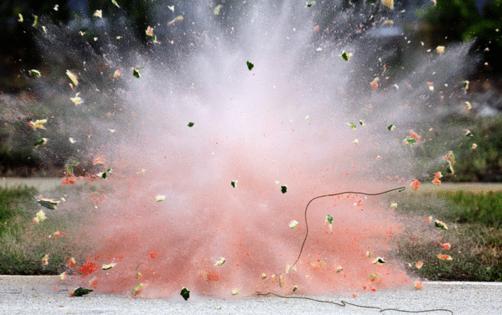Burns and fireworks injuries: What to do when seconds count this July 4th
Published in Health & Fitness
FORT LAUDERDALE, Fla. – From a barbecue explosion to a severe firework injury, a lot can go wrong when celebrating the Fourth of July.
When it does, minutes – even seconds – can significantly impact the extent of the injury.
“Just know that alcohol impairs your reaction time,” said Dr. Randy Katz, Memorial Healthcare System’s district medical director for emergency services.
Firework accidents sent 14,700 people to emergency departments across the nation last year, quickly turning celebration into tragedy. Although prevention is key, Katz says response is also essential.
If a firework or sparkler injures an eye, immediately protect it from pressure or further trauma by placing a cup or makeshift device over it. “You don’t want to cover it with a towel or anything that touches the eye,” Katz advises.
Katz said kids often run with sparklers or use them to sword fight. “It’s easy to sustain an eye injury.”
More than a third of firework burns are to the hands and fingers, according to the U.S. Consumer Product Safety Commission. Should a firework go off in your hand, Katz says, wrap it in a towel and keep it covered until you get to the ED.
Katz, who is also the medical director for the city of Hollywood Fire Rescue, has seen hundreds of emergencies that happen when festivities and celebrations go awry.
On beaches and in backyards, barbecues will be in use this holiday weekend. And that presents a potential danger.
Forty-six-year-old Andrew Sossin knows this well.
On a hot July day, Sossin had friends and family gathered at his Hollywood home, enjoying a backyard barbecue.
His friend, Gabe Zohora, joined him in his outdoor kitchen, ready to man the gas grill together. But when Zohora pushed the button to start the grill, it exploded, setting the nearby cabinets on fire. The explosion caused both men to catch fire as well.
Zohora, a firefighter, followed the protocol. He stopped, dropped and rolled, and then jumped into the saltwater pool. Sossin was propelled in the air and hit the ground face down, his arms and legs smoking. His wife poured water on him and called 911. “I was in and out of consciousness,” he said.
It turned out that Sossin’s grill had a propane leak. Sossin, CEO of Recovery Unplugged, an addiction treatment center, says he hasn’t been able to wear shoes since the accident, and is still healing. His wife’s quick response minimized the burns, he said. Experts advise against removing clothing that is stuck to the burn.
For prevention, experts recommend starting a gas grill with the cover open and checking regularly for propane leaks and proper ventilation. Amazon sells a propane alarm.
At Jackson Memorial’s Miami Burn Center, Dr. Carl Schulman treats the most severe burns. If you catch on fire, from a firework, bonfire, barbecue or cooking incident, Schulman says immediately stop, drop and roll. “We live near water here in South Florida, so a lot of people like to run and jump in the water. That’s not always the best thing. Unless you’re standing on a dock or on the edge of a pool, those few seconds it’s going to take you to run to the water, you’re burning that whole time. It’s much more effective to stop, drop, and roll.”
Schulman also advises against icing a burn, which can cause further damage.
“You can run normal temperature water over it, and then if it’s very serious, of course, call 911 or seek medical care.”
If running water isn’t accessible, a cool, wet cloth can be used as an alternative. However, once the initial pain subsides, you should replace the damp towel with a clean, dry cloth to prevent the burn from becoming infected.
Of course, holiday weekends also are prime time for drownings. Poor visibility in lakes or rivers can be dangerous.
“The hazards sometimes lie not with what meets the eye but what’s beneath it,” says Dr. Purva Grover, emergency medicine physician for Cleveland Clinic Childrens Pediatric Emergency Departments. “So, there are hazards like rocks, plants and debris, which sometimes you really don’t see, especially in the free-flowing natural areas of water.”
If you can’t see the bottom, jumping in head first can lead to spinal injuries. Katz said he has seen those patients in the emergency room. When someone jumps in and doesn’t come up, anyone nearby needs first to get the person out, then keep them immobilized. “Lie them flat on their back and don’t move them until EMS arrives,” Katz said.
On beaches, water conditions can change quickly, and crowded beaches or swimming pools can make it hard to notice when someone slips under the water.
Once you pull someone out, turn them to the side and allow water to escape from the mouth and lungs, Katz said. Then, check for a pulse. If they are not breathing normally or are only gasping, leave them on their back and start chest compressions. “They no longer recommend mouth-to-mouth. Just chest compressions, which can also expel some of the water out of their lungs,” he said. For anyone without a pulse, ask somebody nearby to find an AED and call 911, he said.
At hospitals, emergency department doctors brace for the holiday weekend. At Memorial, Katz said, “We are expecting our trauma program to be busier.”
©2025 South Florida Sun Sentinel. Visit at sun-sentinel.com. Distributed by Tribune Content Agency, LLC.










Comments